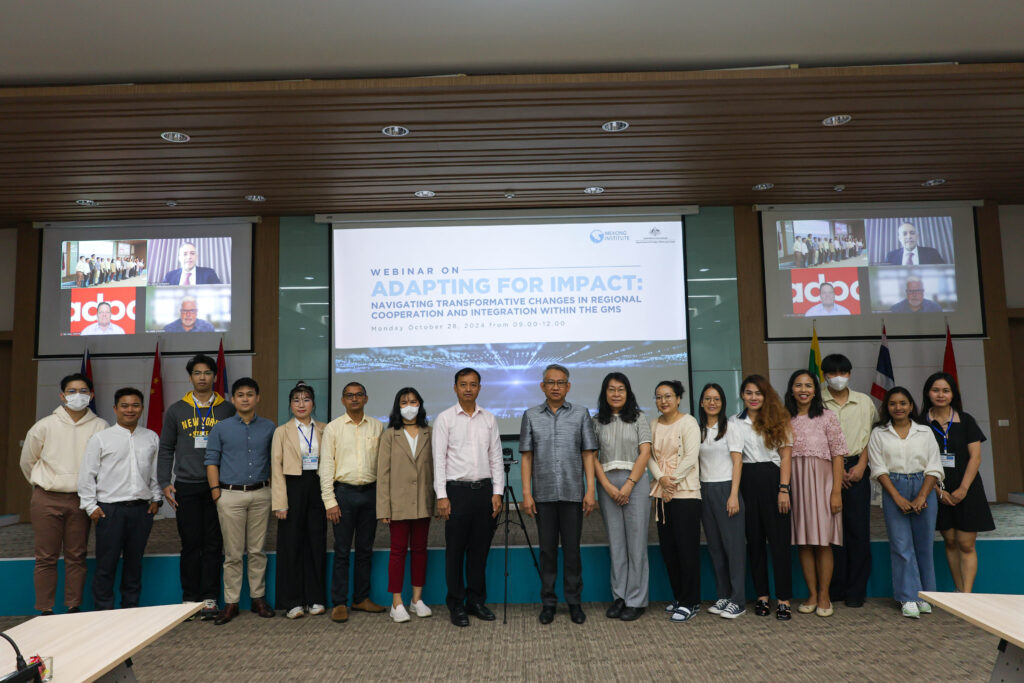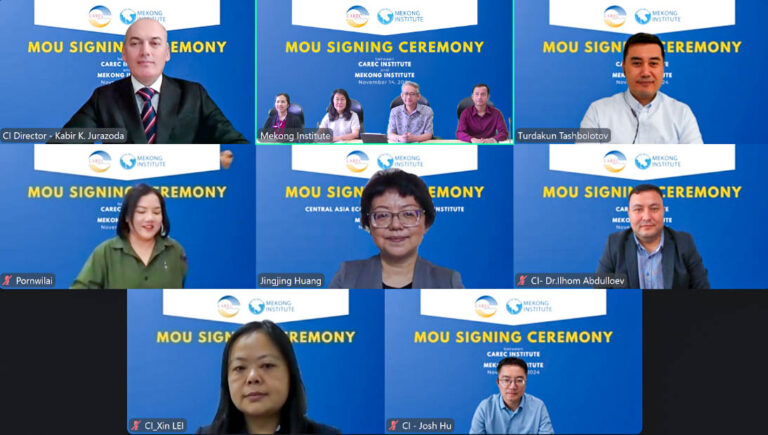Khon Kaen, October 28, 2024 – In response to the evolving landscape in regional development cooperation, the Mekong Institute (MI) hosted a webinar titled “Adapting for Impact: Navigating Transformative Changes in Regional Cooperation and Integration within the GMS.” This session, part of a capacity-building project supported by the Australian Department of Foreign Affairs (DFAT), aimed to strengthen MI’s role in regional cooperation and development initiatives across the Greater Mekong Subregion (GMS).
In his opening remarks, MI Executive Director, Mr. Suriyan Vichitlekarn, noted MI’s evolving role, including providing support to the Ayeyawady–Chao Phraya–Mekong Economic Cooperation Strategy (ACMECS) Interim Secretariat (AIS), established earlier this year. He underscored the need for MI to adapt to emerging trends, such as shifting donor priorities and growing demands for innovative capacity development models. By leveraging MI’s comparative strengths, the organization can stay relevant amid multiple cooperation mechanisms and diverse stakeholder needs.
“We are exploring ways to improve governance, align missions, and enhance resource mobilization to meet the changing expectations of stakeholders across the GMS,” said Mr. Suriyan.
Webinar participants heard a keynote from Mr. Alfredo Perdiguero, Director of the Regional Cooperation and Operations Coordination Division in the Southeast Asia Department of the Asian Development Bank (ADB), who discussed the rapidly evolving challenges facing multilateral development banks (MDBs) and international organizations. He underlined the need for these organizations to adapt quickly to meet complex and evolving demands.
“There are many challenges that the world is facing and we need to respond. We now have a new financing gap, which is related to climate change. There is a need to support not just poor countries, but also upper middle-income countries, such as Thailand or China, which are already quite developed; however, they still need a lot of innovation and even additional financing,” said Mr. Perdiguero.
Another keynote speaker, Mr. Hans Guttman, Executive Director of the Asian Disaster Preparedness Center (ADPC), talked about the complexities of stakeholder engagement in regional cooperation. Drawing on his experience as former Chief Executive Officer of the Mekong River Commission Secretariat and now as the head of ADPC, he explained that countries have different expectations for involving civil society. In some countries, there is a much higher demand for civil engagement than in others. However, with the rise of internet access and increased visibility into international practices, expectations for broader and deeper engagement have significantly grown over the past decade.
The webinar also featured a panel discussion moderated by Mr. Suriyan, where the panelists delved into strategic and operational challenges. Mr. Niall O’Connor, Centre Director of the Stockholm Environment Institute (SEI), stressed the importance of evidence-based decision-making, underscoring the role of scientific data in shaping effective policies. “We bring evidence-based science. It’s not my decision what a politician or decision-maker does; that has to be their decision, but we can provide the evidence and the science.”
The panel discussion provided MI personnel with insights on organizational strategy and operational improvement. Speakers emphasized the importance of coordinated, inclusive efforts to avoid overlap, leverage complementary strengths, and maximize impact. They also recommended strategies for engaging the private sector, linkage of smaller research organizations with larger platforms and networks, and scaling successful pilot projects to drive impactful results. Transparency, trust, and consistent follow-through among partners and stakeholders have also been identified as crucial for robust regional cooperation.
After the webinar, MI staff reflected on the insights gained and their applicability to the organization’s context. Participants evaluated how the inputs could enhance MI’s capabilities in several key areas, including organization strategy, resource mobilization, staff development, and innovations and learning.








